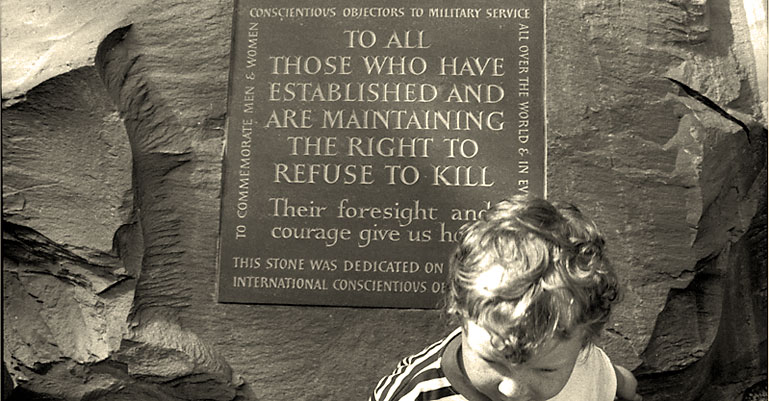
 |
 |
| Conscientious objection stone Tavistock Sq London |
| Bernard Hicken's story | |
What wasn't clear to Bernard was what the outcome of his decision to be a CO would be. 'My whole experience of growing up had been peace and goodwill all the time'; but he'd heard tales of what had happened to COs in the First World War, and knew that peace and goodwill weren't likely. His first tribunal made that certain: he was turned down. 'It was like being in court for having committed a crime. You felt straight away that there was no real rapport or sympathy from the judge.' Bernard immediately appealed against the decision, and his Appeal Tribunal was more successful. He accepted exemption on condition that he did work in horticulture. Soon, however, 'I felt a bit guilty that I was living a life as a civilian while other people of my age were facing death abroad, and I suppose, being human, I wasn't quite satisfied.' For a while he worked on a farm, which was more physically demanding and, he felt, more useful: 'producing food for people in this country'. Then he heard about medical research. COs were being used as human guinea pigs. 'I thought this was something I'd like to do. It's humanitarian, it's helping people, and also there's a certain amount of risk. It was an opportunity to do my bit in a more positive way.' Using COs as guinea pigs was the brainchild of a research biologist called Kenneth Mellanby. One of his projects was studying scabies. Tiny insects burrow into the skin and lay eggs there; this causes intense itching, with sores developing where the sufferer scratches. By 1940 the disease was spreading fast, especially among soldiers, and it wasn't yet known how the mites behaved. Bernard was one of 30 COs who took part in Dr Mellanby's scabies research, which took place in a large Victorian house in Sheffield from December 1940. 'We had scabies mites introduced into our bodies. It wasn't too bad in the daytime, but you spent a lot of the night scratching. The doctor or his assistant studied the way the mites behaved in us, and we learned how to spot scabies among children in the schools.' As a result of the experiment, Dr Mellanby established to his satisfaction that scabies needed warm surroundings in which to incubate, took a long time over it, and could be treated successfully. New experiments were now tried. The behaviour of lice was explored, which Bernard found 'interesting'. Then Dr Mellanby moved on to diet. The 'shipwreck diet' tested how long sailors might remain healthy on lifeboat provisions and scarce water. 'I can't say it made us particularly ill, just headaches and things.' Then Bernard was put on a diet lacking Vitamin A. 'There was uncertainty about that, because Vitamin A is pretty important. But you have this feeling that it's the right thing to do, so you carry on.' He didn't feel ill, but noticed that his night sight had failed. After 18 months, however, 'I suppose nature caught up with me. I was taken to hospital. When I came out I felt like an old man, not someone of 25. It was the end of experiments for me,' he said with regret. | continue |
World War Two - Britain - INDEX |
| menwhosaidno.org |